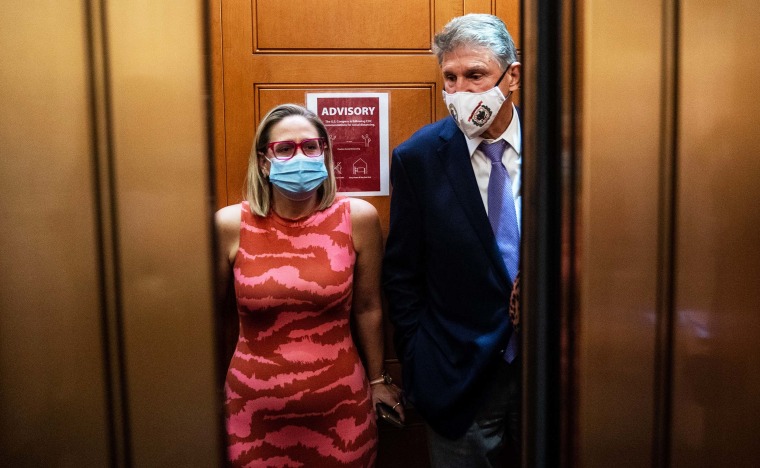It’s hardly a secret that Sen. Joe Manchin was chiefly responsible for the demise of the Build Back Better package, at least in its most recent iteration. The conservative West Virginia Democrat has received considerable pushback from his party, and for good reason.
But as Democrats look ahead and wonder whether some form of the BBB legislation can be salvaged, Manchin poses an important challenge, but he’s not the only challenge. The Wall Street Journal reported this morning that when it comes to tax policy, the West Virginian is actually taking a fairly progressive stance — and it’s Democratic Sen. Kyrsten Sinema of Arizona who’s standing in the way.
In recent weeks, as Democrats’ efforts on the child-care, healthcare and climate package have remained stalled, Mr. Manchin (D., W.Va.) has repeatedly said the party should focus an updated version of the bill on increasing government revenue. Raising taxes enough to more than offset the bill’s spending would reduce the budget deficit and fight inflation, he said, addressing concerns that led him to oppose the House-passed package last year.
I realize that in many progressive circles, Manchin is seen as effectively a Republican, but most notably on taxes, the assessment isn’t true. The West Virginian is prepared to significantly roll back the Republicans’ Trump-era tax breaks — which Manchin voted against at the time — creating a higher corporate tax rate, a higher top marginal rate for the wealthy, a higher capital-gains rate, a higher rate on carried-interest income, and even raising the income threshold for taxes that fund Social Security from $147,000 to $400,000.
While Republicans hate each of these ideas with the heat of a thousand suns, all of this could be done through the budget reconciliation process, and each of these changes would enjoy broad support among congressional Democrats in both chambers.
What’s more, by making these changes, policymakers would be able to make new domestic investments and reduce the deficit, which Manchin considers a priority.

So why don’t Democrats simply do this if the party’s most conservative member is already on board? Because Arizona's Sinema said months ago that she wouldn’t accept any higher rates on the wealthy or big corporations — and by all accounts, the Arizonan hasn’t changed her mind.
The result is two deeply strange dynamics unfolding simultaneously: Sinema is fighting to protect ineffective tax breaks she voted against five years ago, and Manchin is left to encourage one of his Democratic colleagues to be more liberal.
“I respect her and what her concerns may be, but I think basically our financial situation is getting worse, not better, so maybe we can take another look at it,” Manchin told the Wall Street Journal, referring to Sinema. “I would hope so.”
In case this isn’t obvious, if the Build Back Better agenda dies because Sinema was overly committed to protecting GOP tax breaks for the wealthy, her odds of winning a Democratic primary in 2024 will be poor.
